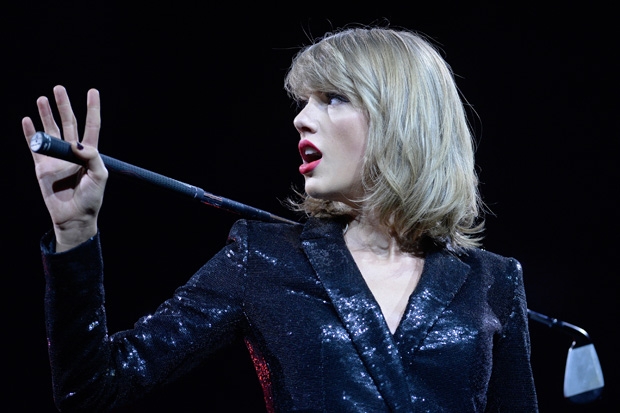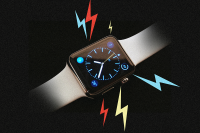All hail Taylor Swift. How she must give baby boomers the fear. Not just baby boomers. Also those who came next, the Generation Xers, who seemed to define themselves culturally mainly via goatees, apathy and heroin. And my own rather listless, half-generation thereafter, with our bigger beards and binge-drinking. Taylor Swift makes us all look old. Because we are old and the world will be hers.
You will have heard about her victory over Apple this week — you must have heard about it, because an opportunity to put Taylor Swift on the front of a newspaper is an opportunity not to be missed, particularly now that Elizabeth Hurley is getting on a bit and Princess Kate isn’t getting out much. In brief, Apple, the great corporate giant, is launching a music streaming service, which essentially allows people to listen to music without buying it, via subscription. For the first three months, Apple had planned to give this music away free, and pay no royalties for doing so. Swift, though, declared it unacceptable that the behemoth would not ‘be paying writers, producers, or artists for those three months’, and threatened to boycott. So over the course of a weekend, Apple changed its mind.
It’s rum, this ‘artists’ business. Everybody likes an artist. Oh, to be an artist. In fact, though, when Swift talks about artists, what she really means is ‘record labels’. Truthfully, this was not a fight between the big guy and the little guys, but one between the big guy and some other guys who are still quite big, but shrinking. The little guy, to be frank, gets screwed either way. Which is not at all how the internet was meant to work out, at least if you’re my age or older. Taylor Swift isn’t, though. Which is the point.
What the internet was meant to do was slay the middleman. Many middlemen, indeed, have been slain, from travel agents to video-rental stores to publishers, and the thinking was, for a generation, that the music industry would soon join them. An ‘artist’ such as Taylor Swift, it was thought, would have no need for it. She’d record her songs, she’d sell her songs, people would download her songs, and that would be that. There would be no more fat bald men in open-necked shirts clinking glasses at awards ceremonies. Their day would be past.
In fact, what we ended up with was different middlemen. A million cottage industries didn’t replace the high street: Amazon did. Film creatives, freed from the constraints of cinema and TV channels, are increasingly subject to the constraints of Netflix instead. And musicians found massive new roadblocks inserted in their direct paths to the public, first via iTunes (really, why did any musician with a website ever even need iTunes?) and now, more devastatingly, with streaming. Streaming is the kicker. Streaming is the point where the middlemen truly rise again. The new media world, streaming tells us, will be much like the old media world, just quite a lot worse for most of the people making the media.
Taylor Swift, in all this, had managed to emerge as a moral lodestar. A year ago, she pulled all of her music from Spotify, then the market-leading streaming service, on the basis that it paid most musicians a pittance. Everybody cheered. Granted, it made her personally quite a lot richer, but that was clearly just a sacrifice she was willing to make. Now, though, she’s acquiesced to a streaming service which is pretty much the same as the one she said ‘no’ to, but managed to do so in a manner that still makes her a hero. Apple must be reeling, wondering how the hell she got away with it. But she did. She definitely did.
As a colleague of mine pointed out, if the European Commission had wanted Apple to change its terms, or the Recording Industry Association of America, then it would have taken half a decade and many millions in legal fees. Swift made it happen over a weekend. Aged 25, she’s the same age Madonna was when she released Like A Virgin, making global headlines via her aggressive sexuality and faint intimations of blasphemy.
For Swift, though, the sexual politics of the 1980s and 1990s are as obsolete as the internet politics of five minutes ago. She is a model of frictionless aspiration; less a rebel, more a CEO. She could be running a tech startup, but instead she’s running herself, and winning adulation for doing so. She’s selling capitalism to an age group that is utterly, instinctively blasé about it, and becoming a generational inspiration for making it very marginally nicer. This is what our future looks like. It’s all so damn functional. Freaks me out.
Parcel farce
The other day I get a card from the Post Office. A package has arrived, but there’s a customs fee on it so I need to go and collect. My local depot has closed, and the new one is two bus rides away, followed by a ten–minute walk through a deserted business park. This is the remote wilderness of almost central London. Once I finally get there, the guy behind the counter tells me they only take cash. ‘Or you can pay online,’ he says, ‘and we’ll resend it within three working days.’ ‘Can’t I pay online now,’ I say, ‘with my phone, and then take it away?’ ‘Nope,’ he says. ‘But you’re holding it in your hand,’ I say, ‘and I’m right here.’ ‘I can’t help you,’ he says. So I go away.







Comments